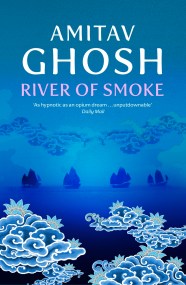‘As hypnotic as an opium dream and pretty unputdownable’ Daily Mail
In September 1838 a storm blows up on the Indian Ocean and the Ibis, a ship carrying a consignment of convicts and indentured laborers from Calcutta to Mauritius, is caught up in the whirlwind. When the seas settle, five men have disappeared – two lascars, two convicts and one of the passengers. Did the same storm upend the fortunes of those aboard the Anahita, an opium carrier heading towards Canton? And what fate befell those aboard the Redruth, a sturdy two-masted brig heading East out of Cornwall? Was it the storm that altered their course or were the destinies of these passengers at the mercy of even more powerful forces?
On the grand scale of an historical epic, River of Smoke follows its storm-tossed characters to the crowded harbors of China. There, despite efforts of the emperor to stop them, ships from Europe and India exchange their cargoes of opium for boxes of tea, silk, porcelain and silver. Among them are Bahram Modi, a wealthy Parsi opium merchant out of Bombay, his estranged half-Chinese son Ah Fatt, the orphaned Paulette and a motley collection of others whose pursuit of romance, riches and a legendary rare flower have thrown together. All struggle to cope with their losses – and for some, unimaginable freedoms – in the alleys and crowded waterways of 19th century Canton.
As transporting and mesmerizing as an opiate induced dream, River of Smoke will soon be heralded as a masterpiece of twenty-first century literature.
In September 1838 a storm blows up on the Indian Ocean and the Ibis, a ship carrying a consignment of convicts and indentured laborers from Calcutta to Mauritius, is caught up in the whirlwind. When the seas settle, five men have disappeared – two lascars, two convicts and one of the passengers. Did the same storm upend the fortunes of those aboard the Anahita, an opium carrier heading towards Canton? And what fate befell those aboard the Redruth, a sturdy two-masted brig heading East out of Cornwall? Was it the storm that altered their course or were the destinies of these passengers at the mercy of even more powerful forces?
On the grand scale of an historical epic, River of Smoke follows its storm-tossed characters to the crowded harbors of China. There, despite efforts of the emperor to stop them, ships from Europe and India exchange their cargoes of opium for boxes of tea, silk, porcelain and silver. Among them are Bahram Modi, a wealthy Parsi opium merchant out of Bombay, his estranged half-Chinese son Ah Fatt, the orphaned Paulette and a motley collection of others whose pursuit of romance, riches and a legendary rare flower have thrown together. All struggle to cope with their losses – and for some, unimaginable freedoms – in the alleys and crowded waterways of 19th century Canton.
As transporting and mesmerizing as an opiate induced dream, River of Smoke will soon be heralded as a masterpiece of twenty-first century literature.
Newsletter Signup
By clicking ‘Sign Up,’ I acknowledge that I have read and agree to Hachette Book Group’s Privacy Policy and Terms of Use
Reviews
'Ghosh's novel is a tense, compelling account... The accumulation of minutiae puts the reader so firmly in the time and place that the whole thing becomes as hypnotic as an opium dream and pretty unputdownable'
'For those who like to see history bought alive through the deployment of wave upon wave of plausible detail, River of Smoke should prove a marvellous read'
'Any good historical novel should teach the reader some history as well as sweeping him or her along with an unfolding narrative. Few do this as well as Amitav Ghosh. A book whose conclusion again left me panting for the next volume in this trilogy'
'The novel's strength lies in how thoroughly Ghosh fills out his research with his novelistic fantasy, seduced by each new situation that presents itself and each new character, so that the scenes read with a sensual freshness as if they were happening now'
Best of all, Ghosh, through the depth of his research, lightly worn, has captured the many cross-currents of a fascinating historical period
Praise for Sea of Poppies
'Ripping post-colonial yarn ... Ghosh spins a fine story with a quite irresistible flow, breathing exuberant life ... an absorbing vision'




